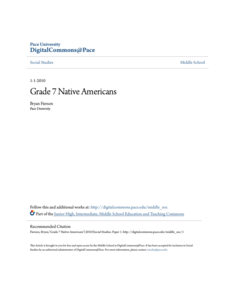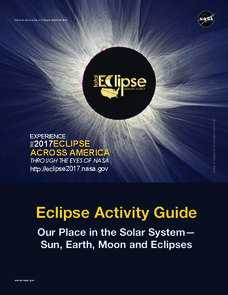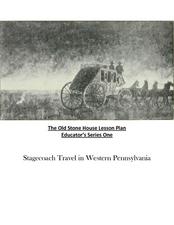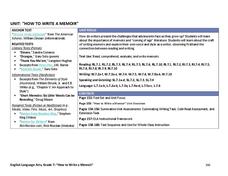Core Knowledge Foundation
Third Grade Skills Unit 9: The Age of Exploration
The Age of Exploration is the theme of a unit designed to boost third-grade ELA skills. Scholars practice spelling patterns, examine words with prefixes and suffixes, build sentences with linking words, and use comparative and...
American Library Association
Explorers Project
Delve into the Age of Exploration with a multiple-intelligences research project. Learners generate a rubric and worksheet to guide their studies and research one explorer. There is emphasis on research skills, citing sources,...
Curated OER
Introduction to Age of Absolutism
Who were the absolute monarchs of Europe and what effect did they have on their countries? Young historians begin by naming qualities they believe are important for a monarch to possess. They then take notes on four key factors...
Core Knowledge Foundation
The Viking Age Tell It Again!™ Read-Aloud Anthology
A two-week read-aloud anthology explores the Viking Age. Scholars complete lessons that include reading, discussion, extension activities, and take-home materials. Pausing points signal assessment opportunities.
Pace University
Native Americans
Introduce middle schoolers to the First Nations that inhabited the Northeast during the Age of Exploration with a series of activities designed for differentiated groups.
University of Minnesota
Memory Items
Ready to have an "unforgettable" time in science class? Try a fun and insightful activity, suitable for a wide age group of learners. Explore how human memory works when pupils try to remember objects they've seen before comparing the...
Facebook
Public Wi-Fi
Sometimes free Wi-Fi comes with a hefty price tag! Networking novices examine the components of a Wi-Fi network during a digital citizenship lesson plan from an extensive series. Groups work together to map out a day's worth of Internet...
New York City Department of Education
Geography and Early Peoples of the Western Hemisphere
Young historians discover the early people of the western hemisphere. The unit explores how the land changed, how it was used and homes of early Americans such as Incas, Mayans, Inuits, Aztecs, and Pueblos. Individuals also examine these...
NASA
Eclipse Activity Guide
Ever made solar s'mores? Or recreated the solar system using peanuts? Astronomers young and old investigate all things solar using a variety of activities. Explore how the sun works, types of light it emits, and methods of charting the...
NOAA
Mid-Ocean Ridges Interactive
Your class will be on top of their game when it comes to mid-ocean ridges! The second installment in a 13-part series focuses on the 65,000-km underwater ridge system that spans our globe. Junior oceanographers practice placing the...
Howard Hughes Medical Institute
Ebola: Disease Detectives
How did the Ebola virus first infect humans? Young virologists examine genetic sequences from the 2014 Sierra Leone outbreak to find similarities during a riveting activity. Following similar methods used by MIT and Harvard, partners...
Facebook
Who Do You Want to Be?
Can posting art or music online lead to the career of your dreams? Inquisitive individuals consider their social media presence with a lesson from a series focusing on identity exploration and digital citizenship. Pairs put their heads...
Curated OER
Noisy Nora, Studious Students: Story Elements
Alliterative adjective nicknames generate stories inspired by Rosemary Wells' book Noisy Nora (also a thematic complement to any class with children who make a ruckus to get attention). Class members explore basic story elements --...
North Carolina State University
Shapes
Expose youngsters to 3-D objects in a hands-on learning activity involving marshmallows and toothpicks. Engage your young mathematicians by introducing them to 3-D shapes by means of a story book. Explore 3-D shapes by manipulating...
Howard Hughes Medical Institute
Deep History of Life on Earth
Take it all the way back! Young scientists discover the changes that took place from the time Earth became solid to present day through an interesting interactive. The resource guides users through key events that have shaped our world...
Social Media Toolbox
Social Media Usage
Is there a difference in the way organizations present news via social media and in print? The third in a series of 16 lessons from The Social Media Toolbox explores news outlets and their delivery methods. Groups follow a story for a...
Facebook
Cybersecurity, Phishing, and Spam
Take a serious look at an equally serious topic! Security scholars explore and discuss the methods hackers use to gain access to personal information during a well-written digital citizenship activity. Part of an extensive series, the...
NASA
Planning Time
Ever feel there's just not enough hours in the day? Young adults explore an important part of personal development using a group of activities. After comparing how they actually spend their time with how they would like to, scholars...
Curated OER
Introduce Vocabulary: Mama, Do You Love Me? (Joosse)
Barbara Joosse approaches an age-old question through an equally traditional culture in her story Mama, Do You Love Me?, which helps budding readers explore Native American vocabulary in context. Here you'll find...
NOAA
Seamounts
How do chains of islands form? Young oceanographers explore the mountains of the deep in the final installment in a 13-part series. The interactive compares types of seamounts based on their overall height and height under the water, as...
Curated OER
Old Stone House Lesson Plan
From stagecoach to railroad tracks, your class will discover how advancements in travel in the United States during the nineteenth century played an integral role in the industrialization and development of American society. The main...
University of Kansas
Feelings - Thematic Unit
Boost language skills with a unit all about feelings. Scholars from all grade levels take part in several lessons that incorporate specific vocabulary terms and adjectives while discussing their feelings with their peers. Reading...
Louisiana Department of Education
How to Write a Memoir
Who are we and what shapes our identities? Seventh graders work to answer this question as they learn how to write a memoir. Full of non-print resources and supplemental texts that range from fiction to non-fiction, scholars write their...
Science 4 Inquiry
The Classification of Living Things
It's a classification sensation! Demystify why we classify using an inquiry activity that helps your class sort things out. Groups begin by classifying a variety of shoes before they research organisms and design their own dichotomous...

























